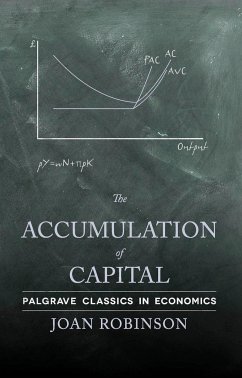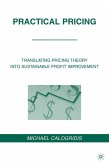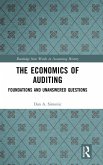Joan Robinson is one of the most prominent economists of the twentieth Century. Among her voluminous contributions to economics, she is most notably renowned for her exposition and development of growth theory.
Since John Maynard Keynes's General Theory the centre of interest in economics had shifted from problems of short-period fluctuations (booms and slumps) to long-run development, but a systematic treatment of the subject, showing the relations of the analysis of the long-run trend of an economy to the short-period theory on the one side, and to static theory on the other, had been almost entirely lacking. In this seminal work, Joan Robinson extends Keynes' General Theory to account for the long-run issues of growth and capital accumulation. Robinson's research goes back to the beginning and examines the basic theory that is needed for a coherent treatment of the problems that present themselves in a developing economy.
This book is essential reading for all interested in history in economic thought, growth theory development economics.
Since John Maynard Keynes's General Theory the centre of interest in economics had shifted from problems of short-period fluctuations (booms and slumps) to long-run development, but a systematic treatment of the subject, showing the relations of the analysis of the long-run trend of an economy to the short-period theory on the one side, and to static theory on the other, had been almost entirely lacking. In this seminal work, Joan Robinson extends Keynes' General Theory to account for the long-run issues of growth and capital accumulation. Robinson's research goes back to the beginning and examines the basic theory that is needed for a coherent treatment of the problems that present themselves in a developing economy.
This book is essential reading for all interested in history in economic thought, growth theory development economics.
'Classics are classics for a reason. Classics show us that when we flatter ourselves into thinking we have clear title to the ideas we advance, they are really just borrowed from a more eloquent past. Robinson's The Accumulation of Capital shows how difficult it is in economics today to say something that is both new and profound. Her blend of theory and realism is what we all strive for in parsing modern economic problems. Her criticisms of the orthodoxy were enormously productive in that economic methodologies have blossomed to account for inadequacies she pointed out in the equilibrium approach. To Robinson and The Accumulation of Capital we are all deeply indebted, whether we realize it or not.'
Bill Gibson, John Converse Professor of Economics, University of Vermont, USA
'Joan Robinson's most difficult and ambitious book still constitutes a formidable challenge to contemporary theory. Her search for the fundamental but simple principles which underlie the process of growth in a classical Marxian-Kaleckian-Keynesian setting contrasts sharply with the logic and the language of current growth models. Her extraordinary command of logic allowed her to dispense with mathematics, with no loss of clarity and insights. The new Introduction by two leading Robinson scholars provides the thread leading through the labyrinth of case studies and changes in assumptions. It will certainly attract fresh readers to her book, and also lure back those already acquainted with it.'
Maria Cristina Marcuzzo, Professor of Economics, Sapienza, University of Rome, Italy
Bill Gibson, John Converse Professor of Economics, University of Vermont, USA
'Joan Robinson's most difficult and ambitious book still constitutes a formidable challenge to contemporary theory. Her search for the fundamental but simple principles which underlie the process of growth in a classical Marxian-Kaleckian-Keynesian setting contrasts sharply with the logic and the language of current growth models. Her extraordinary command of logic allowed her to dispense with mathematics, with no loss of clarity and insights. The new Introduction by two leading Robinson scholars provides the thread leading through the labyrinth of case studies and changes in assumptions. It will certainly attract fresh readers to her book, and also lure back those already acquainted with it.'
Maria Cristina Marcuzzo, Professor of Economics, Sapienza, University of Rome, Italy








